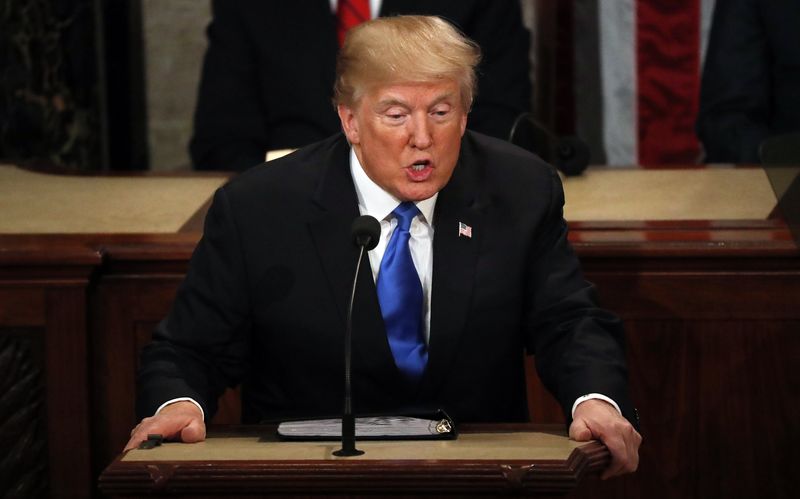By Matt Spetalnick and David Brunnstrom
WASHINGTON (Reuters) - Branding North Korea’s leadership “depraved,” President Donald Trump told Americans on Tuesday that Pyongyang’s pursuit of nuclear missiles could “very soon threaten our homeland” and vowed a continued campaign to prevent that.
In his first State of the Union speech to the U.S. Congress, Trump’s tough rhetoric underscored persistent tensions despite recent talks between North and South Korea that led to Pyongyang’s agreement to participate in next month’s Winter Olympic games hosted by the South.
“North Korea's reckless pursuit of nuclear missiles could very soon threaten our homeland,” Trump said. “We are waging a campaign of maximum pressure to prevent that from ever happening.”
“We need only look at the depraved character of the North Korean regime to understand the nature of the nuclear threat it could pose to America and to our allies,” he said.
Trump offered no new prescription or specifics on how he intended to rein in North Korea.
Hours before the speech, news broke that Victor Cha, who had expressed concerns about the possibility of a limited U.S. "bloody nose" strike on North Korea, was not longer being considered as the next U.S. ambassador to South Korea.
While Trump's administration says it prefers a diplomatic solution to the crisis over North Korea's development of weapons capable of hitting the United States, it says all options are on the table, including military ones.
Trump has exchanged insults and threats with North Korean leader Kim Jong Un and officials say he and his advisers have discussed a preventative strike against North Korea, alarming experts who warn that this could trigger catastrophic retaliation, especially on South Korea.
Attending the State of the Union address as Trump’s guests were the parents of Otto Warmbier, an American college student who died in June shortly after he was released from North Korea in a coma. “Tonight, we pledge to honor Otto's memory with total American resolve,” Trump said, as the tearful parents looked on.
Another in the audience was North Korean defector Ji Seong-ho, who also shed tears as Trump described his escape from North Korea, where he had been run over by a train while trying to steal coal to barter for food.
Trump called Ji, who suffered torture and starvation and lost a hand and a foot, a witness to the “ominous” nature of North Korea's government. Ji now heads a group that rescues and resettles North Korean refugees.
AMBASSADOR DROPPED
Earlier on Tuesday, U.S. officials said that Cha, a former White House official who for months had been in line to be the next U.S. ambassador to South Korea, was no longer being considered for the job.
The Washington Post quoted people familiar with the matter as saying Cha, a Korean-American, had raised concerns with White House officials about the consequences of a bloody nose strike and the administration’s threats to tear up a trade deal with South Korea, a U.S. treaty ally.
In an article in the Washington Post on Tuesday, Cha said a preventative military strike was not the way to deal with the crisis as it carried a huge risk of escalating into a war that could kill hundreds of thousands of Americans.
"Force will be necessary to deal with North Korea if it attacks first, but not through a preventative strike that could start a nuclear war," Cha wrote.
U.S. officials have said the debate on military action has lost some momentum as a result of the North-South talks.
The vice chairman of the U.S. Joint Chiefs of Staff said on Tuesday that North Korea's nuclear program had made strides in recent months but had not yet demonstrated all the components of an intercontinental ballistic missile (ICBM), including a survivable re-entry vehicle that can deliver a nuclear weapon.
Air Force General Paul Selva also said he was confident that if required the United States would be able to destroy "most" of North Korea's nuclear missile infrastructure.
North Korea tested a new ICBM last November which it said could reach all of the United States. U.S.-based experts said data from the test appeared to support that.
Trump refrained in his speech from referring to Kim as “Rocket Man,” a disparaging nickname he has used before. But he said “no regime has oppressed its own citizens more totally or brutally than the cruel dictatorship in North Korea.”
Trump had recently held back on harsher language after having threatened last year to unleash "fire and fury” on North Korea, which has threatened to target U.S. Pacific territory of Guam.

Despite the recent North-South diplomacy, Kim has shown no sign of willingness to give in to U.S. demands and negotiate away a weapons program he sees as vital to his survival.